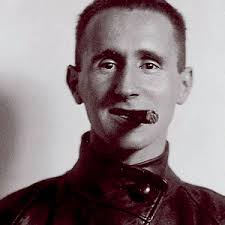
image source: http://www.brechtsociety.org/
Bertolt Brecht is best known for his plays and poems, in which he embraced anti-bourgeois themes and being forced from his native Germany.
http://www.biography.com/people/bertolt-brecht-9225028
Summary
The subject matter
- Narratives are displaced in time and place
- Political parables
- Epic storytelling
The political purpose or message or dramatic intention
- Heavily influenced by political ideals. Karl Marx
- To arouse in the audience a need for change
- To keep an audience thinking
The actor-audience relationship
- The role of the narrator/chorus. Direct address
- The isolating of songs as a form of comment
- The abolition of illusion
- The audience encouraged to smoke and drink
The staging form adopted
- The proscenium arch
- Epic as opposed to dramatic (Aristotelian)
- Swiftly changing scenes
Directorial interpretation/production style
- The director as part of a team
- The use of music to comment on the action
- Very refined and specific detail
- Clear and carefully constructed stage pictures
Design elements
- Realistic selective detail
- Very well-made props
- Costumes made to look well worn
Role of actors and performance style
- The actor in a role not a character
- The actor as demonstrator
- The actor as the main source of distancing
- The use of gestus
Technical elements
- Hard white light from a visible source
- The half-curtain
- The revolve
Audience response
- To be alerted to the need for change
- To observe rather than empathise